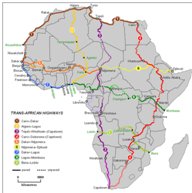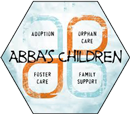You may wonder, “What exactly is the African Highway?” No, it doesn’t refer to the road infrastructure that the United Nations is  planning for the African continent. Granted, the roads in various African countries could do with some attention. Expert opinion even holds that a proper highway network across the African continent would yield economic growth of billions for participating countries. But there is another “African Highway” that holds more significance, provides better advantages and adds more value to the lives of those it touches.
planning for the African continent. Granted, the roads in various African countries could do with some attention. Expert opinion even holds that a proper highway network across the African continent would yield economic growth of billions for participating countries. But there is another “African Highway” that holds more significance, provides better advantages and adds more value to the lives of those it touches.
It began with a few whispers. In recent years it grew to a steady stream of voices across the globe talking about the significance of a spiritual road winding from the southern tip of Africa to Jerusalem: “the road from Table Mount to Temple Mount”.
The African Highway Network is an initiative of Hebrew People. Our own involvement in the African continent beyond the borders of South Africa began in Kenya. We started out with leadership development initiatives and assisting an orphans and vulnerable children programme at an organisation called Life Line Educational Center through financial support as well as ongoing education for the staff and other related organisations. We also implemented a primary healthcare programme at the school.
During our visits to Kenya we were touched by the extreme needs of the people in Nairobi. We realised that more had to be done. Increasingly more people and organisations from the broader community of Nairobi approached us for help with the implementation of a primary healthcare programme as well as leadership development in different disciplines. We came to the conclusion that significant and lasting change could only come if we could involve the entire broader community as opposed to one small section of the community. Moreover, we are also convinced that all initiatives to be undertaken can only be implemented in conjunction with and with the blessing of the national and local government as well as the involvement of all community leaders.
The basic needs of the people must be met holistically. Solid healthcare awareness and good living conditions must be created through mentorship in a diverse number of initiatives. We need to implement educational programmes and establish resource centers from where we can administer the advisory services and administration for the basic life skills. It is crucial to ensure that the people are brought to a place of economic empowerment. This is, however, only possible if we bring about a new paradigm, which will elevate the people out of a mentality of suffering and defeat to a new mindset of the possibilities, which awaits them.
We need a model for transformation, aimed at establishing mentorship in the community that will bring about unity and a community spirit of goodwill. It is crucial that the model is developed in such a manner as to reach the entire community. More importantly, the model must be geared towards uniting the whole community and in particular the leaders of social, non-government and government institutions around the model and values to bring about change. This change will occur when people see their role models in the community acting with integrity and the community becoming responsible for its own welfare. We need to create a spirit of servitude in the community where the wellbeing of the entire community is considered as a top priority.
This model must be aimed at changing the mindset of the people, which will result in the people being elevated out of their circumstances into a sustainably changed lifestyle where their needs are met on a consistent basis. The youth must be given purpose and hope for a brighter future. The facilitation of such a paradigm shift will ensure strong family values, economic growth, enhanced healthcare, improved moral standards as well as safety and security.
A comprehensive plan to achieve the above is only possible if people from different social, non-government and government institutions unite around such a transformation model. It will require an exceptionally well-planned strategy and involvement from all related parties. It is thus vital to work closely with all the relevant role players.
The time has come for believers in the Messiah to turn their words into actions. It is up to you and me to take those actions that will pioneer, construct and sustain this “African Highway” from Table Mount to Temple Mount. We all form part of the Heavenly Father’s task team. We want to give credit to those people who are already doing tremendous work with regards to this initiative. However, all these efforts could escalate into something much more significant and meaningful if everybody works together and shares their knowledge.
This is the purpose of this initiative we have given the name “the African Highway”. Our intention is not to create one entity to accomplish that which is envisioned in this model, but rather to develop as a platform or network through which those working in synergy with the African Highway model can share in the wealth of knowledge and expertise. By doing so we can all achieve much more.
In line with this thinking we arranged a week of discussions during February 2012. People from different countries and continents with a common interest in this initiative gathered in Namibia. After a week of in-depth discussions, the delegates of the African Highway Conference in Namibia agreed on the following resolutions:
 The African Highway model must be fashioned on the principle that effective and lasting transformation can only be achieved in any region, country or on the continent of Africa if it is done from the basis of a healthy community of belivers. Such a community of believers must operate on the principles taught in the Bible book of Acts. The fundamental principle is discipleship or mentorship, by which not only knowledge but also skills and, more importantly, values, are transferred.
The African Highway model must be fashioned on the principle that effective and lasting transformation can only be achieved in any region, country or on the continent of Africa if it is done from the basis of a healthy community of belivers. Such a community of believers must operate on the principles taught in the Bible book of Acts. The fundamental principle is discipleship or mentorship, by which not only knowledge but also skills and, more importantly, values, are transferred.
Community living based on Scriptural principles is the real answer to launch all the facets of the model from theory to practice and guarantee its ongoing success. The checks and balances to cause a shift in paradigms, a change in destiny and the transformation of communities, which will ensure the success of the model, are locked up in the values, culture, associations and keys to success found in the Scriptures. It is thus crucial to equip the community leaders and elders as well as the people in the community to live according to Scriptural principles.
The community must become visible in the eyes of the broader public through actions which will be inclusive of everybody. We thus need two basic principles for such a community:
- It is important to create common ground for all the peoples in the community to unite through a unified vision instead of theology. The desire of the Father in heaven is to have us worship Him. He wants to dwell in and among us and He lives in the praises of His people. We must thus find the best possible way to discover common ground from which to express this truth; and
- The community must have a vision beyond its own boundaries. It is vital to develop a team of people who will be able to duplicate the work of the comminity in other communities, regions and countries. The community must identify the location or locations where the community will duplicate itself as well as the people through whom this can be accomplished. read more …
Once we establish these to principals in the community, we can become involved in the broader practical living of the community. The practical areas of educational and humanitarian work on which the African Highway will focus are:
 a. Community leadership development programmes aimed at shifting paradigms and changing the mindset of community leaders, who will in turn influence the lives of those around them. It is important to reach the leadership within the communities who can influence the people in community programmes, through which they will bring about a changed lifestyle in the communities. read more …
a. Community leadership development programmes aimed at shifting paradigms and changing the mindset of community leaders, who will in turn influence the lives of those around them. It is important to reach the leadership within the communities who can influence the people in community programmes, through which they will bring about a changed lifestyle in the communities. read more …
 b. The community’s education remains the responsibility of the community. Programmes geared specifically towards children as well as adults must be developed to raise the level of solid education to empower people to live meaningful lives. Such programmes will also raise the community members’ level of expectation and help them see possibilities that will provide them with the ability to create wealth. read more …
b. The community’s education remains the responsibility of the community. Programmes geared specifically towards children as well as adults must be developed to raise the level of solid education to empower people to live meaningful lives. Such programmes will also raise the community members’ level of expectation and help them see possibilities that will provide them with the ability to create wealth. read more …
 c. Everybody has the basic need for food and shelter. This is especiality true for orphans and vulnerable children. The orphans and vulnerable children problem in Africa escalates daily. It is, however, important to remember that these children are the future of Africa. If we can reach these children and change their mindsets, they will turn Africa around. Moreover, if we fail to reach them for the Gospel, it leaves them vulnerable to the influences of other religious groups. read more …
c. Everybody has the basic need for food and shelter. This is especiality true for orphans and vulnerable children. The orphans and vulnerable children problem in Africa escalates daily. It is, however, important to remember that these children are the future of Africa. If we can reach these children and change their mindsets, they will turn Africa around. Moreover, if we fail to reach them for the Gospel, it leaves them vulnerable to the influences of other religious groups. read more …
 d. Sustainable primary healthcare projects for both children and adults must be implemented. Healthcare can be extremely costly. However, with the proper preventative healthcare, the costs involved reduce significantly. Africa needs more preventative care to curb the outbreak and spread of epidemics, which could also threaten medical conditions in other countries and continents. read more …
d. Sustainable primary healthcare projects for both children and adults must be implemented. Healthcare can be extremely costly. However, with the proper preventative healthcare, the costs involved reduce significantly. Africa needs more preventative care to curb the outbreak and spread of epidemics, which could also threaten medical conditions in other countries and continents. read more …
 e. Sustainable agricultural initiatives should be introduced in communities. This must include training on how to farm with livestock as well as seed that does not only provide a harvest, but also reproduces for the future. This ensures seed for sowing as well as bread for the table. When Scritural principles are applied, a larger than normal harvest can be expected. read more …
e. Sustainable agricultural initiatives should be introduced in communities. This must include training on how to farm with livestock as well as seed that does not only provide a harvest, but also reproduces for the future. This ensures seed for sowing as well as bread for the table. When Scritural principles are applied, a larger than normal harvest can be expected. read more …
 f. Sustainable skills training for adults must be introduced. Such training will empower them to live self-sustainable lives and provide them with life skills as well as guidance on exploring and breaking into markets with the relevant produce. There is an old saying that teaches us to provide a person with a fishing rod instead of a fish. However, the proverbial fishing rod in itself is unable to provide the desired results. Instead of merely providing the knowledge and the tools, we have to train people to develop and manage their own sustainable small and medium enterprises and to manage their resources. It is, however, important that a firm foundation be laid first to establish what an entrepreneur is before furnishing people with the means to become one. read more …
f. Sustainable skills training for adults must be introduced. Such training will empower them to live self-sustainable lives and provide them with life skills as well as guidance on exploring and breaking into markets with the relevant produce. There is an old saying that teaches us to provide a person with a fishing rod instead of a fish. However, the proverbial fishing rod in itself is unable to provide the desired results. Instead of merely providing the knowledge and the tools, we have to train people to develop and manage their own sustainable small and medium enterprises and to manage their resources. It is, however, important that a firm foundation be laid first to establish what an entrepreneur is before furnishing people with the means to become one. read more …
 g. Hospitality and tourism have always been one of the most lucrative ways of earning income. It can literally turn the economy of any region around from poverty to prosperity. Africa has the potential to provide multiple facets in tourism and hospitality. Moreover, its wide range of landscapes means that numerous different activities can be structured to meet the diverse needs of tourists. read more …
g. Hospitality and tourism have always been one of the most lucrative ways of earning income. It can literally turn the economy of any region around from poverty to prosperity. Africa has the potential to provide multiple facets in tourism and hospitality. Moreover, its wide range of landscapes means that numerous different activities can be structured to meet the diverse needs of tourists. read more …
 h. Going Green in Africa relates to the question of how to harness the renewable sources of energy we have. We have an ample supply of sun, wind, water, plants and other sources for green energy, but how do we harness these renewable sources to supply in the ever-growing energy needs of the continent? Moreover, how do we find natural ways of cleaning our water sources in our quest of primary healthcare in Africa? read more …
h. Going Green in Africa relates to the question of how to harness the renewable sources of energy we have. We have an ample supply of sun, wind, water, plants and other sources for green energy, but how do we harness these renewable sources to supply in the ever-growing energy needs of the continent? Moreover, how do we find natural ways of cleaning our water sources in our quest of primary healthcare in Africa? read more …
 i. Joint marketing initiatives should be implemented, through which the model’s services and products can be marketed and distributed to ensure continued markets. The challenges that small and medium enterprises face usually relate to penetrating the markets. Small and medium enterprises must join forces in their marketing and distribution efforts without giving up the right of the individual owner to personal prosperity. read more …
i. Joint marketing initiatives should be implemented, through which the model’s services and products can be marketed and distributed to ensure continued markets. The challenges that small and medium enterprises face usually relate to penetrating the markets. Small and medium enterprises must join forces in their marketing and distribution efforts without giving up the right of the individual owner to personal prosperity. read more …
 j. Management with integrity, responsibility and servitude will provide the project with the necessary advisory services and ensure solid administration and operational management is crucial. The challenge is to ensure processes that will both eliminate corruption and ensure participation on the basis of equal opportunity. Poverty does not have preference for race and colour. It is time for Africa to move beyond the prejudices of the past and build a future together on the basis of shared interests. read more …
j. Management with integrity, responsibility and servitude will provide the project with the necessary advisory services and ensure solid administration and operational management is crucial. The challenge is to ensure processes that will both eliminate corruption and ensure participation on the basis of equal opportunity. Poverty does not have preference for race and colour. It is time for Africa to move beyond the prejudices of the past and build a future together on the basis of shared interests. read more …
We believe that our relationship with the Heavenly Father is not just something that we must experience on a spiritual level, but also something that we need to see manifested in every other facet of our lives. It is this belief that urged us to create the African Highway initiative. The idea behind the African Highway is to be a catalyst for different indivuduals and social, non-government and government institutions to join forces to bring about prosperity for all the African people. We do not view Africa as an underdeveloped continent with problems which cannot be solved, but rather as an emerging people who can overcome the challenges of development if we will allow the message of the Gospel to become the centre of our vision, values, culture, associations and keys to success.
We want to invite everyone who is interested in this initiative to participate in our next round of meetings. The aim of these meetings will be to prepare a strategy for implementation of transformation for the African Highway model.
Thank you for taking the time and effort to peruse this vision with us as we discuss what the Father wants to achieve in Africa and through Africa in these days. We are interested in hearing your voice in helping to formulate a strategy for implementation. Please write to info@africanhighway.net. The next African Highway conference will be announced on this page.
We are looking forward to your input in achieving this important task.